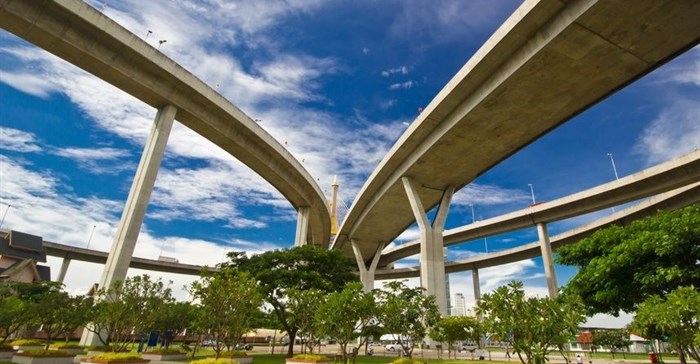Transportation is a crucial engine for growth and social development in South Africa and more importantly for trade into neighbouring countries as road and rail networks are the backbone of any economy.

©Phiroon Leelasaksiri via
123RFMaking connections for an integrated Africa
"If we look at the current state; within sub-Saharan Africa (SSA) there are fifteen landlocked countries and they have an average distance of 1000kms to the sea. This means that these countries are reliant on infrastructure networks, which are currently poorly installed and not well maintained - to conduct trade and grow their industries and economies to create a larger marketplace for Africans," says Vishaal Lutchman, divisional director, Parsons Brinckerhoff, Development, Transportation and Infrastructure, Africa.
Adv. Fay Mukaddam, president of the Johannesburg Chamber of Commerce and Industry (JCCI), concurs: "There's no doubt that the current poor state of transport links between African countries continues to stifle trade and expansion growth opportunities on the continent. The ability to increase intra-Africa trade, which is essential to sustainable growth on the continent, presents significant motivation for integration. There is a dire need for public and private sectors across the SSA region to continue developing key transport corridors."
"More often than not transport infrastructure will be designed and positioned around an economy's primary movement of goods and services, which certainly are important to be able to unlock these corridors and, more so, look at cost effective solutions for businesses," adds Lutchman. Africa's diagnosis of being a hub of global economic growth is hindered by undefined rail corridors with insufficient capacity across the country, which is also said to be not seamless for trade.
"Elements of the transport system, including infrastructure, development and the vehicles that use it, are interconnected and interdependent on one another. Each element has an effect on the system as a whole," says Grant Fraser, product and marketing director at MiX Telematics (Africa). "While emerging markets continue to look to rail infrastructure improvements to further their own growth, there is still the matter of transportation from rail networks to business sites - essential to business continuity and productivity. Consequently, transportation of railed goods is diverted onto road. It is not only about getting vehicles on the road, but rather keeping them there, both cost-effectively and efficiently."
Consequential costs incurred
Mukaddam adds: "Having to divert the transportation of goods and services from rail to road incurs additional costs for business. For this reason, they require access to improved technology and processes that afford businesses to grow in importance. As a result, we need to make sure that there are modern and reliable transport solutions to ensure that the continent's corridors are not only sustainable but operational."
"As profit margins decrease, innovative technology solutions will play a key role in the sustainability and operational aspect of any business that operates a fleet of vehicles using such transport corridors. In the fleet sector, this is possible with the aid of a sound and profitable business model - driven predominantly by fuel savings and enhanced driver safety," says Fraser.
Fuel is critical to the effective operation of transport dependent businesses and reducing this expenditure is key to keeping it lean. "Improving driver behaviour, through fleet management, can reduce fuel costs by up to 15%. Another aspect to consider is the increasing occurrences of fuel theft. To optimise fuel spend, companies should start planning now by investigating technologies that minimise these incidents and improve cost efficiencies - especially where infrastructure currently lends itself to less effective routes and as a result, more kilometres travelled," adds Fraser.
Solving regional integration
The challenge, within the infrastructure development arena to improve the transport opportunities is the numerous complexities to regional integration. These continue to present grave stumbling blocks to developing an integrated transport infrastructure plan. Some of these challenges include, but not limited to; political instabilities, trade policies that are outdated and misaligned and that the countries in SSA are at various levels of development, which means there's no common base to work from.
Furthermore, the integration of major transportation infrastructure projects needs to be completed on a government-to-government level. "This is vital in unlocking true economic potential, which also enables the creation of more jobs and trade," adds Mukaddam.
"With this in mind, leaders in SSA have to seriously consider whether having a borderless SSA continent is what they really want. And if their answer is yes; then the current generation of leaders need to consider if they are defining the opportunity correctly and, what legacy they wish to be remembered for," adds Lutchman.
"By collaborating, leaders in Africa needs to make an effort to seek awareness and purpose for their nations - on what needs to be done, why and when. This will mean resisting to define the actions based on the constraints and rather look at the opportunities that will enable the economies who are investing in massive infrastructure projects to minimise wastages and maximise on spending - thus empowering the project outcomes - and only once implemented will Africa be truly integrated," continues Lutchman.
"As transport networks are not only essential for economic prosperity; it has far-reaching effects on society and the natural environment. This not only impacts today but on the future. Transportation through regional integration should not be underestimated as it is a crucial catalyst of African economic growth prospects. Today's decisions will have an impact on the future of the transport industry - what will it mean if there is a lack of planning and future vision - especially in the face of rising economic pressures?" concludes Mukaddam.












































